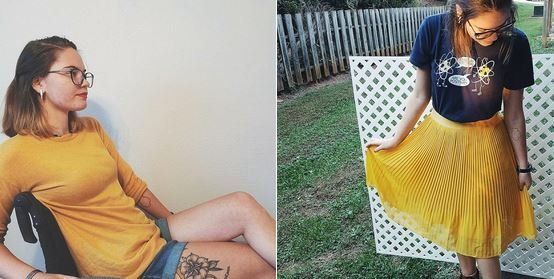Thousands share their invisible disabilities on Twitter
- Published

Using the hashtag #InvisiblyDisabledLooksLike, Twitter users across the world with hidden disabilities have been sharing pictures and stories to challenge society's perceptions.
Many people live with hidden disabilities - a physical, mental, sensory or neurological condition which don't have physical signs but are painful, exhausting and isolating.
They must also deal with the frustration, misunderstandings and false perceptions arising from the unseen nature of their conditions.
A billion people around the world live with some kind of disability according to the World Health Organization, and one US survey found 74% of those with disabilities do not use a wheelchair or anything which might visually signal their disability.
Allow Twitter content?
This article contains content provided by Twitter. We ask for your permission before anything is loaded, as they may be using cookies and other technologies. You may want to read Twitter’s cookie policy, external and privacy policy, external before accepting. To view this content choose ‘accept and continue’.
The hashtag, started on Monday by Florida-based activist Annie Segarra, is part of Invisible Disabilities Week, which took place last week, to raise the awareness of hidden conditions.
So far, the term has been tweeted more than 3,000 times, peaking on Wednesday morning and used by deaf actor and model Nyle DiMarco.
The hashtag prompted many people to share their selfies and experiences.
Allow Twitter content?
This article contains content provided by Twitter. We ask for your permission before anything is loaded, as they may be using cookies and other technologies. You may want to read Twitter’s cookie policy, external and privacy policy, external before accepting. To view this content choose ‘accept and continue’.
Allow Twitter content?
This article contains content provided by Twitter. We ask for your permission before anything is loaded, as they may be using cookies and other technologies. You may want to read Twitter’s cookie policy, external and privacy policy, external before accepting. To view this content choose ‘accept and continue’.
Allow Twitter content?
This article contains content provided by Twitter. We ask for your permission before anything is loaded, as they may be using cookies and other technologies. You may want to read Twitter’s cookie policy, external and privacy policy, external before accepting. To view this content choose ‘accept and continue’.
Dani Barley, from Sydney, Australia, told the BBC she "can walk around a bit," but uses a wheelchair to help others be "comfortable with the idea of me as a younger person being disabled.
"If I tried to self identify as disabled due to mental health and chronic pain issues, people would minimise it, saying, 'Oh, I don't see you as disabled,' as if it were some kind of self-slur rather than a valid identity.
"Now, as a mum and university student, people assume the only access issues I have are stairs, not course content, weather, timing of classes, etc., related to PTSD and chronic pain.
"And the reason I love these hashtags, and have started to participate in them, is they are so educational for those of us inside and outside of the disability rights community."
You may also like:
Meanwhile, Mark Falconer shared his story of having an invisible disability and his experience of how others have seen him.
Allow Twitter content?
This article contains content provided by Twitter. We ask for your permission before anything is loaded, as they may be using cookies and other technologies. You may want to read Twitter’s cookie policy, external and privacy policy, external before accepting. To view this content choose ‘accept and continue’.
Allow Twitter content?
This article contains content provided by Twitter. We ask for your permission before anything is loaded, as they may be using cookies and other technologies. You may want to read Twitter’s cookie policy, external and privacy policy, external before accepting. To view this content choose ‘accept and continue’.
Allow Twitter content?
This article contains content provided by Twitter. We ask for your permission before anything is loaded, as they may be using cookies and other technologies. You may want to read Twitter’s cookie policy, external and privacy policy, external before accepting. To view this content choose ‘accept and continue’.
Danielle, studying in Cambridge, UK, has a combination of myalgic encephalopathy (ME), fibromyalgia, and postural orthostatic tachycardia syndrome, and tweeted she was "terrified of using a walking aid, asking for priority seats," and being "judged."
"My disabilities mean that some days I can attend lectures, and be functional," she told the BBC. "Others, I am bed bound, unable to shower, make meals, and am consistently being physically sick from pain.
"The only support I've had is cognitive behavioural therapy, which obviously is not helpful for pain, just for learning to live with the disabilities. It is frustrating, because I know that there is incredible research going on in private medicine and treatments that could possibly change my life, but I can't access them. All I am offered is more and more painkillers; tramadol and codeine, gabapentin - at my worst, I was on upwards of 20 tablets a day.
"I decided to be open on twitter because I have a moderately large following. ME is such a stigmatised and misunderstood illness - even with professionals.
"I want to use my platform to the best of my abilities, especially as I am very aware many have it much worse than me."
- Published24 October 2017
- Published5 July 2017
- Published28 April 2017